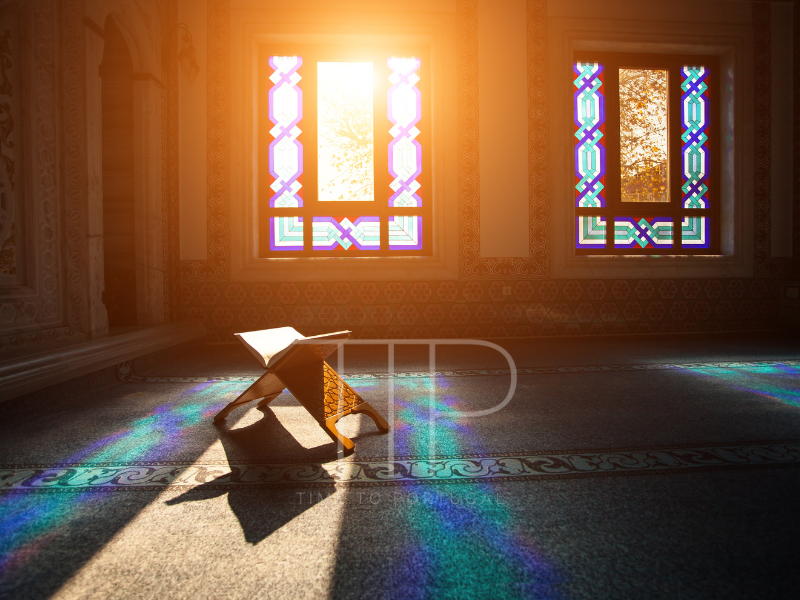The mosques in Mouraria are unable to accommodate all those who come to them, who queue outside, waiting for their turn to pray and to see “the commitment” of the Lisbon City Council to build a new space fulfilled.
The gathering is bigger on Fridays, a holy day for Islam. The queue diverges: on one side is the mosque on Rua do Terreirinho, which is smaller, on the other is the Islamic Center of Bangladesh, in the alley of São Marçal.
Down Rua do Benformoso and up Calçada Agostinho de Carvalho, as one o’clock approaches, more and more men take up positions, old and young, even children, from a variety of backgrounds, but predominantly from the Asian continent.
During the changeover between prayers, those inside leave quickly, even without putting on their shoes, so as not to waste time. Outside, some people have been waiting for more than two hours.
With a capacity for 500 people and two carpeted rooms, one upstairs and one downstairs, the Islamic Center of Bangladesh is waiting for a new location, promised by Lisbon City Hall 12 years ago – when António Costa was mayor.
The current space, bought by the Bangladeshi community many years ago, doesn’t offer security to all the worshippers who seek it out, acknowledges Rana Taslim Uddin, president of the Islamic Centre of Bangladesh, who, when he arrived in Mouraria in 1991, was one of six Bangladeshi citizens. “This mosque doesn’t have the right conditions, because there’s no emergency exit, no windows, […] it’s very difficult in the heat,” he says, estimating that a place of worship is needed “for more or less two thousand people”.
There are currently an estimated 60,000 Bengalis living in Portugal, mainly engaged in commerce.
During Ramadan, the holy month for Muslims, the Muslims of Mouraria can’t even break their fast together, as tradition dictates. And the current place of worship has no separate prayer room for women.
A few days ago, Rana invited the current mayor of Lisbon, Carlos Moedas (PSD), to visit the mosque. “The new mayor hasn’t responded yet,” he told Lusa, lamenting: “Politicians are in the moment, but then they forget.”
The current place of worship “is unsuitable for the many people it attracts”, agrees Miguel Coelho, president of the Santa Maria Maior Parish Council (PS), considering that it is “absolutely necessary” to fulfill “the commitment made” and “voted for by all the city’s political forces, including the representatives of the democratic right, the PSD and CDS”. The new space is needed “precisely so that these people don’t have to set up informal mosques in garage or store spaces”, he points out.
The project to build a new mosque in Mouraria, which began in 2012, has since been mired in protests and delays. Initially, it was planned to demolish buildings to create a square that would allow access to the place of worship via a pedestrian walkway between Rua da Palma and Rua do Benformoso.
In 2015, the matter was discussed again at a public meeting of the Lisbon City Council, this time to ask the Municipal Assembly to approve the declaration of public utility for the expropriation of the buildings needed to carry out the project – a proposal that was unanimously approved.
However, a court challenge to the expropriation of two buildings by the owners, questioning the amount of compensation, delayed the whole process and the city council subsequently admitted to reformulating the project. In June 2023, the PS in the Lisbon Municipal Assembly criticized the “noisy silence” on the project to build a mosque in Mouraria.
In response, the deputy mayor, Filipe Anacoreta Correia (CDS-PP), said that the municipality had carried out all the procedures it had to on the Mouraria mosque project and “there has been no decision” on the matter.
Asked by Lusa about plans to build a new mosque in Mouraria, Lisbon City Council did not respond.
The Mouraria area today concentrates a significant South Asian community, mostly from Bangladesh, India, Nepal and Pakistan. Shopkeepers in the area complain that the current situation – with a high concentration of Muslim worshippers on the streets, particularly on Fridays – is detrimental to business. “People can’t all fit inside and they have to pray in the street and that does cause strangeness at times, but nothing more than that,” says Miguel Coelho. “We don’t have a religious conflict here,” assures the mayor.

